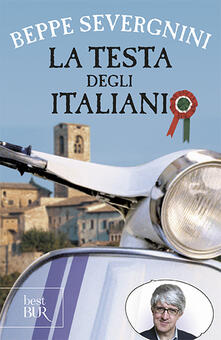 Being an Italian is not an easy job. Italy is world renowned for contradictions (beside fashion, food and Ferrari) and living here is something that needs a life to become used to. Italy has also a wealth of problem mostly deriving from the (bad) attitudes of its inhabitants. A book on the Italian attitudes and custom looks very attractive to my curiosity inclined nature. The writer is an authority in this field. He worked several years abroad and wrote a couple of books on other country people and their customs as opposed to Italian way of behave and doing things.
Being an Italian is not an easy job. Italy is world renowned for contradictions (beside fashion, food and Ferrari) and living here is something that needs a life to become used to. Italy has also a wealth of problem mostly deriving from the (bad) attitudes of its inhabitants. A book on the Italian attitudes and custom looks very attractive to my curiosity inclined nature. The writer is an authority in this field. He worked several years abroad and wrote a couple of books on other country people and their customs as opposed to Italian way of behave and doing things.
For all these reasons the book by Severgnini (the title could be translated as “Italian’s minds”) was a welcome one and I get hooked from the very first pages telling about an Italian airport.
Unfortunately the interest fades while the reading progressed. At about one third, it becomes clear that a plot is missing. The idea of presenting Italy to foreigners by a 10 days travel is clearly an excuse, but the lack of a plot and the lack of overall glue make it so evidently a pretext that nearly hurts. The book turns out to be just a collection of memories, observations, some statistics and comments about Italian customs more and more uninspired and repetitive as the reader approaches to the end.
Not that this is too bad, but after the first half it gets somewhat boring. This book could have been improved by halving it, removing pointless parts and sticking with the funnier. About fun, Severgnini knows his art. When he is inspired he writes pleasantly deep considerations with a brilliant humor.
I am legend
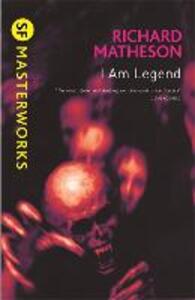 his booklet has been a pleasant surprise. The idea is intriguing – the main character is the last human surviving on earth where the rest of mankind has been turned into vampires.He discovers to be somewhat immune to their bytes, nonetheless he has to defend himself against vampire hordes hungry of flesh and blood. During the day he is quite free to go around and take what he needs from the deserted city. Moreover during the day he turns in the hunter trying to kill (forever) the undead breed.
his booklet has been a pleasant surprise. The idea is intriguing – the main character is the last human surviving on earth where the rest of mankind has been turned into vampires.He discovers to be somewhat immune to their bytes, nonetheless he has to defend himself against vampire hordes hungry of flesh and blood. During the day he is quite free to go around and take what he needs from the deserted city. Moreover during the day he turns in the hunter trying to kill (forever) the undead breed.
The man fortifies his home, sets up an engine power supply to have light and electricity. But this is not the story of a modern Robinson Crusoe; this is a story about fighting. Fighting against the failure and loneliness first, fighting against alcoholic addiction, fighting against the vampire disease with the scientific method weapons, and last fighting against the purposeless survival instinct when he understand that he’s obsolete.
This is the sad conclusion, understanding that normality is just what most people consider to be normal, therefore it is relative and not absolute, thus finding himself belonging to the past, on the way to take the role of deviant and anomalous.
Once upon a time vampires were rare and they had to stay hidden because of their diversity, fearing the outside world full of normal people ready to kill them. For this reason they were placed in an imaginary existence, they were deemed legends. Now its time for revenge: he is going to be the anomaly; he’s going to be considered legend.
I like to think that there is another reading for the title. The main character is so great and powerful in its way of fighting and winning that it cannot be considered legendary.
Harry Potter and the Half Blood Prince
HP6 came under the best premises. I pre-ordered it on Amazon saving 30%, then, after delivery I got another $ back from Amazon because they find a better agreement allowing them to make a better price, and last I received it the day before leaving for holidays. Everything went fine and smooth, so I was positively biased.
I found this book to be really good, with less mysteries to solve and more depth, overall a more enjoyable reading like if turning a bit down the pace the effort went in quality.
In this book more and more I felt drawn into the HP’s world. Also the story diverged from the standard template the other books accustomed us. It still tells about a school year, but the ending is more open, this book sets the stage for a follow up radically different.
I think everyone knows by now that Dumbledore is going to die, and this is a really touching point in the story, I was left with a sense of sadness and lost for a couple of day in the real life.
Characters are growing up, and the story becomes more mature as well. As already laid out in the previous episodes, the boundaries between good and evil become more fuzzy, people deeply convinced of acting for good sake will end in doing wrong. I would have expected HP to be tempted of joining Voldemort side to add some more tension to the character, but this wasn’t the case. Voldemort is actively trying to destroy everything is important to Harry leaving him no other way that Good.
Tensions in Harry are whether or not to declare himself to Jinny, how to let Ron and Hermione to reconcile, why no one believes him when he says that Draco is a Death Eater… well nothing particularly new.
I think that the magic of the book is in how it is written in the world described and how they are described, in the ingenuity involved.
I have a hope, I strongly hope that one day, maybe not the next book, nor the one after, but eventually this masterpiece will come to an end. Stories must end. The end alone is half of the story, while I fear, being HP a goldmine, that this would turn in an endless soap-opera with HP turned in some rogue hero fighting against an endlessly re-spawning enemy.
What if red hood fable instead of ending with the death of the wolf, would have ended with the wolf escaping and RedHood and her granny starting an EvilWolf Private Eye investigation company?
Angels and Daemons
 Writing a bad review of Angels and Daemons is like shooting at the ambulance, really too easy.The basis on which the entire novel holds are weak (problem: how would you find an object framed by a wireless cam? Just search the radio transmitter). CERN has an entire web section dedicated to the novel and to the antimatter stuff explaining why what described by Dan Brown can’t physically happen. Moreover anyone that ever used a battery powered device knows that batteries are far to have a second perfect discharge time. As it is quite … ehm… unlikely? that falling thousands meters from the sky you can really slow your vertical speed with a sheet of cover and even more … unlikely you can maneuver it to adjust your fall onto a precise objective.
Writing a bad review of Angels and Daemons is like shooting at the ambulance, really too easy.The basis on which the entire novel holds are weak (problem: how would you find an object framed by a wireless cam? Just search the radio transmitter). CERN has an entire web section dedicated to the novel and to the antimatter stuff explaining why what described by Dan Brown can’t physically happen. Moreover anyone that ever used a battery powered device knows that batteries are far to have a second perfect discharge time. As it is quite … ehm… unlikely? that falling thousands meters from the sky you can really slow your vertical speed with a sheet of cover and even more … unlikely you can maneuver it to adjust your fall onto a precise objective.
If the main character is somewhat more defined and refined of the protagonist of the previous novel, the other characters are quite dull and not developed.
The final revelation comes all but unexpected and lets you wonder how that extent of madness could go unnoticed by everyone close to the Camerlengo.
The narrative pace has also an hard time to reach the right beat, with a quite slow part before the hunt for the killer begins.
Well, once all this has been told, is Angels and Daemons a bad book? I can’t say so. After all the writing technique of Dan Brown and his deep knowledge of the reader psychology makes it really hard for you to drop the book before you read the word “end”.
Also the matter narrated is very intriguing by itself – secret society, obscure plots, the pope election rituals, the Vatican secret library, the Swiss Guard and so on.
When I read the “Da Vinci Code” I thought it was a sort of manifest per advertising some ideas (about the origin of the Christian religion, about the Sion’s priorate). Since a great effort went in the description and motivation of this stuff and so little in the developing a character believability.
After reading Angels and Daemons I reckon this is just the author style, excellent in creating addiction, very good at presenting secret society and little known facts of our past, but rather weak on characters and rough about plot.
Baudolino
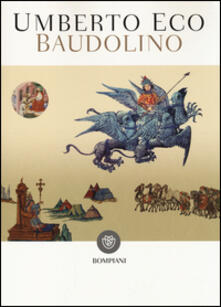 Umberto Eco is for sure one of the more knowledgeable men of our times. He’s main interest is semiotic, but he knows about everything on the middle age topic. In his books I read in the past, his huge knowledge transpired from every page. I don’t know if it is the will to teach, or the familiarity he has with facts, stories, concepts, that leads him to write very dense novels. Enjoyable plots that need a great deal of patience to read.
Umberto Eco is for sure one of the more knowledgeable men of our times. He’s main interest is semiotic, but he knows about everything on the middle age topic. In his books I read in the past, his huge knowledge transpired from every page. I don’t know if it is the will to teach, or the familiarity he has with facts, stories, concepts, that leads him to write very dense novels. Enjoyable plots that need a great deal of patience to read.
For these reason I was quite surprise when started reading Baudolino. The first half of the book was a really smooth reading. Funny at times, interesting because many aspect of the middle-age life style and story were presented to the reader as part of the plot, and not forced into.
Unfortunately I found the second half of the book less smooth, never reaching the levels of “The Focault’s Pendulum”, nonetheless quite different from the first part.
The story is about a boy named Baudolino from a small Northern Italy village. One day he meet a man which turns out to be the Emperor Frederic ReadBeard. The Emperor is lost in the forest and Baudolino leads him, unknowing of his real identity, to home. For this reason the Emperor decides to take Baudolino under his wing and brings the boy along him and later will send young Baudolino to the University of Paris.
Baudolino is very clever and inclined to smart lies, but above all is really fitting its time.
Belonging to Emperor Court, Baudolino is more or less involved in every events of the time – wars, councils, siege.
In fact the story is presented as Baudolino, now about 60, telling it to a historian in Bisanzio.
About every middle age myth, event, every day life is touched in the novel – the Graal, the unknown lands to east, the pervasive religiousness. It is likely that you can read “Baudolino” on more levels. Hardly some ideas, some dialogues, some points can be placed where they are by chance, or just because Eco didn’t find a better place. Anyway further levels of readings remain quite beyond my reach :-). For sure one of the central theme is lie, truth and doubt. Baudolino is telling lies to the historian, but they fit the expectation of the time and they build up an intriguing story. On the other hand the historian has to tell history by selecting what is worth and what is not and adjusting things so that a sense could emerge.
Stupid White Men
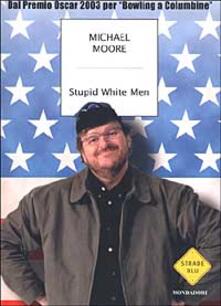 Well this was a worth reading. Some parts of the book seems to have been added just to reach an adequate size. Despite of this the book is able to shred some light on the 2000 elections, and the party who is driving the most powerful country on this Earth.I read some time ago another Moore’s book: Dude, Where’s My Country, more targeted at 9/11 facts. And it was a worth reading, too.
Well this was a worth reading. Some parts of the book seems to have been added just to reach an adequate size. Despite of this the book is able to shred some light on the 2000 elections, and the party who is driving the most powerful country on this Earth.I read some time ago another Moore’s book: Dude, Where’s My Country, more targeted at 9/11 facts. And it was a worth reading, too.
Michael style is direct and straightforward. Every important claim is documented through some reference.
Secrets, Lies, and Democracy (Real Story)
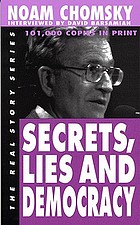 This is the first book by Chomsky I read. To be precise this is a collection of Chomsky’s answers in a radio talkshow to listeners’ questions. From this answers you get Chomsky’s interpretation of the last century facts. You may not agree, nonetheless his interpretation is very fitting. Definitively a worth reading. What I didn’t like is that the Italian publisher added his entries in the associations list provided by Chomsky at the end of the book. The result is that you cannot distinguish from which are recommended by Chomsky and which are recommended by the publisher. I won’t add much because I think it is better everyone form his/her own opinion on this stuff.
This is the first book by Chomsky I read. To be precise this is a collection of Chomsky’s answers in a radio talkshow to listeners’ questions. From this answers you get Chomsky’s interpretation of the last century facts. You may not agree, nonetheless his interpretation is very fitting. Definitively a worth reading. What I didn’t like is that the Italian publisher added his entries in the associations list provided by Chomsky at the end of the book. The result is that you cannot distinguish from which are recommended by Chomsky and which are recommended by the publisher. I won’t add much because I think it is better everyone form his/her own opinion on this stuff.
Witches Abroad
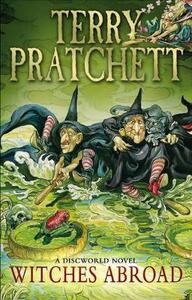 This is the second book by Pratchett I read in original language. Pratchett is great, as usual, in clever entertainment. You don’t get just some funny jokes, but the plot depth and the characterization are up to the best novels I read. The plot is about godmothering vs. witchcraft. The usual witch party – Granny Weatherwax, Nanny Ogg and Magrat Garlick – is going to the distant city of Genua to perform some godmothering duties, having Magrat inherited a godmother fairy wand.
This is the second book by Pratchett I read in original language. Pratchett is great, as usual, in clever entertainment. You don’t get just some funny jokes, but the plot depth and the characterization are up to the best novels I read. The plot is about godmothering vs. witchcraft. The usual witch party – Granny Weatherwax, Nanny Ogg and Magrat Garlick – is going to the distant city of Genua to perform some godmothering duties, having Magrat inherited a godmother fairy wand.
For the non-native-english reader the book is plenty of challenges. Witches speak odd word you aren’t likely to find in a conventional dictionary. The only way I found to get the sense of these tough parts is to go for the likely pronunciation and finding assonance with known words. Also there are some parts, some sentences you are sure are some sort of joke, pun or distortion of the like, but remain quite obscure.
Nonetheless the reading is really worth the effort… Reading twice or thrice the same page to (try to) get every bit of meaning lets you taste the book better and better.
Also expect big laugh, there are unforgettable moments which made me hilarious despite being in a crowded train carriage.
The Art of Unix Programming
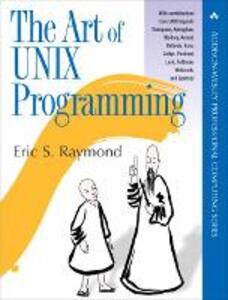 (This book is also available for free here). The Art of Unix Programming is about Unix culture and about old-style Unix programmers approach to design and interface their application. It is not, strictly speaking about programming (nor about art), but the title correctly propose the idea of a balanced approach based on good instincts and well behaved practices.
(This book is also available for free here). The Art of Unix Programming is about Unix culture and about old-style Unix programmers approach to design and interface their application. It is not, strictly speaking about programming (nor about art), but the title correctly propose the idea of a balanced approach based on good instincts and well behaved practices.
I wrote “old-style” because the author is strongly rooted in the Unix culture and more about text oriented stuff rather than interactive GUI. Also “old-style” was about sharing and community much like GNU/Linux today as opposing to proprietary Unixes which are about making money by selling software.
The author presents 17 rules considered the basics for Unix philosophy how these are driving development and why they are good. These rules are very close to software engineering principles. Call them rules, call them principles, what is important is that these are things worth doing.
Trying to tackle nearly everything is going on in Unix and abstracting from it in a generalization is not an easy tasks. And in the long run the book loses here and there some of the interest it triggers in the most entertaining pages. Even if Unix is not your main development environment, I think that some parts of the books are nonetheless worth reading. You can have an idea of the book by browsing it on-line before deciding if it’ll be your next buy.
The criticism about OO is appropriate. I mean every paradigm could promote bad habits and OO is not an exception. One of the bad habits of OO is to create too many layers of encapsulation and inheritance for the problem. Causing the resulting code to be encapsulated but obscure with too much spred mechanics. A good quote in the book, even if it hasn’t to be taken to letter, is “If you know what you’re doing, three layers is enough; if you don’t, even seventeen levels won’t help” – attributed to The Elements of Networking Style. iUniverse.com. 2000. ISBN 0-595-08879-1).
The Da Vinci Code
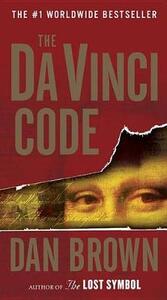 This is the book of the year I suppose, being in the international top ten for a while now. This was a Xmas present for my brother who has been so nice to lend it to me. The book is indeed addicting, to the point that you have to be really brave to drop it. I read it in 4 days only because I was forced to make some pauses.
This is the book of the year I suppose, being in the international top ten for a while now. This was a Xmas present for my brother who has been so nice to lend it to me. The book is indeed addicting, to the point that you have to be really brave to drop it. I read it in 4 days only because I was forced to make some pauses.
Despite the excellent writing technique, I found it somewhat weak in logic. I mean more than one riddle is easy for the reader to solve well in advance of the characters. Also, it is not clear why the Evil One, while being too clever to organize all the script, miserably fails to uncover himself when he has the treasure in his hands.
My impression was that this is a manifesto book, as much as The Celestine Prophecy is a manifesto to the New Age ideology. The book is deeply descriptive of secret societies’ history and the Christian religion origin. I guess many facts reported are real.
But from a research point of view, I prefer a book such as The Templar Revelation, which is full of references to sources and material for further research.